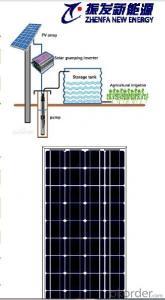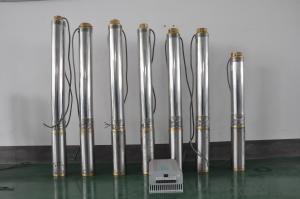Zhenfa 120W-140W Solar DC Pump
- Loading Port:
- China Main Port
- Payment Terms:
- TT OR LC
- Min Order Qty:
- -
- Supply Capability:
- -
OKorder Service Pledge
Quality Product, Order Online Tracking, Timely Delivery
OKorder Financial Service
Credit Rating, Credit Services, Credit Purchasing
You Might Also Like
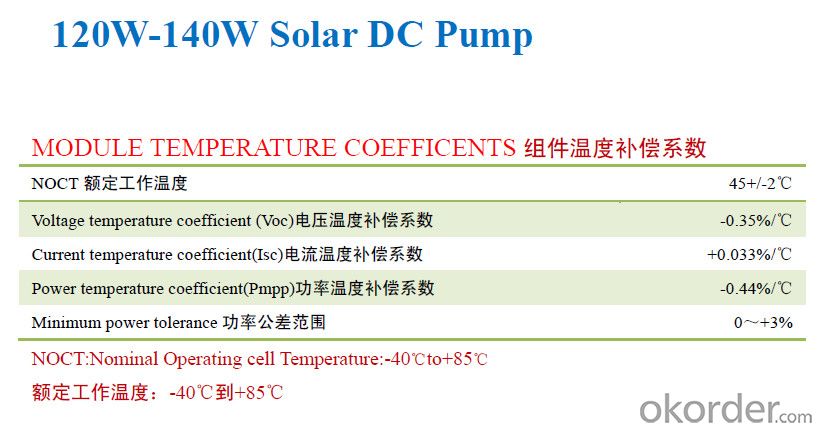
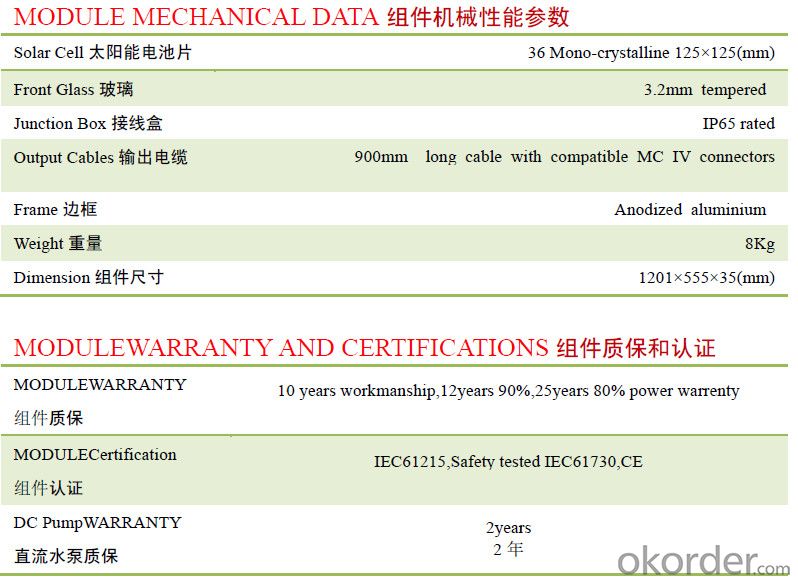
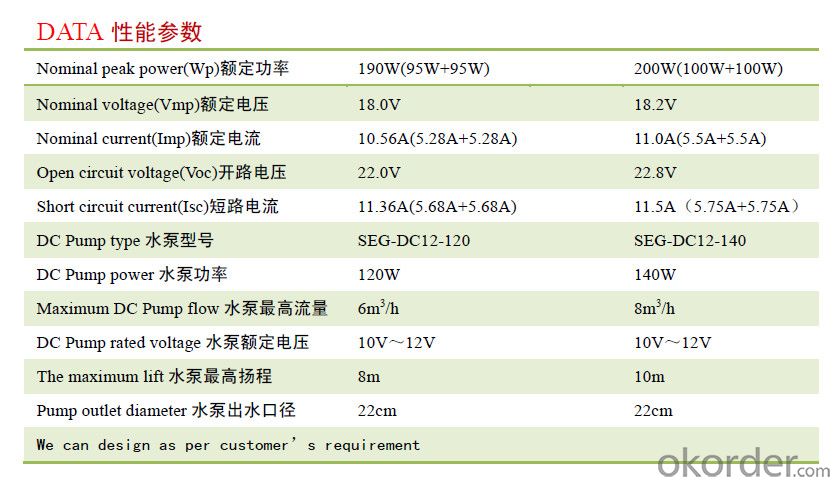
In certain emerging markets, Zhenfa new energy offers home owners complete residential solar system solutions to meet their green energy needs. Zhenfa's residential solar power systems are designed to meet different building applications in system sizes of 1.68kW and 3.9kW. Zhenfa also provides customized solar system solutions for special solar power systemapplications.
- Q:How does a solar pump handle water source contamination from paper or pulp mills?
- A solar pump, like any other pump, does not have the ability to handle water source contamination from paper or pulp mills. The pump's primary function is to extract water from a source and deliver it to a desired location. Dealing with water contamination requires appropriate filtration or treatment systems specifically designed to remove the pollutants caused by paper or pulp mills.
- Q:Can a solar pump be used for agricultural applications?
- Yes, a solar pump can be used for agricultural applications. Solar pumps can be used to provide water for irrigation systems, livestock watering, and other agricultural needs. They are cost-effective, environmentally friendly, and can help reduce dependence on traditional electricity sources in remote or off-grid areas.
- Q:Can a solar pump be used for mine dewatering?
- Indeed, mine dewatering can be accomplished with the utilization of a solar pump. These pumps are not only friendly to the environment but also provide a cost-efficient alternative for expelling water from mines. By harnessing the power of solar energy, they eliminate the necessity for electricity or fuel. Furthermore, solar pumps possess the capacity to manage substantial amounts of water and can be tailored to fulfill the precise demands of mine dewatering. Moreover, their reliability is remarkable, requiring only minimal maintenance. Additionally, the employment of solar pumps in mine dewatering diminishes the carbon footprint and lessens dependence on fossil fuels, thereby establishing a sustainable solution for mining operations.
- Q:How does the performance of a solar pump vary with different sunlight intensities?
- The performance of a solar pump varies with different sunlight intensities. Solar pumps are designed to operate using solar energy, which means they are directly affected by the amount of sunlight available. When sunlight intensity is high, meaning there is abundant sunshine, the solar pump will have a higher performance. This is because the solar panels will receive more sunlight and produce more electricity, which in turn powers the pump to operate at its maximum capacity. The higher the sunlight intensity, the more energy is generated and the more efficiently the pump can function. On the other hand, when sunlight intensity is low, such as during cloudy or overcast days, the performance of the solar pump will be reduced. This is because there is less sunlight available for the solar panels to convert into electricity. As a result, the pump may operate at a slower speed or even stop working altogether if the sunlight intensity is too low. It is important to note that the performance of a solar pump is not solely dependent on sunlight intensity. Other factors like the efficiency of the solar panels, the size of the pump, and the capacity of the battery (if present) also play a role in determining its overall performance. However, sunlight intensity remains a critical factor as it directly affects the amount of energy that can be harnessed from the sun, thereby impacting the efficiency and output of the solar pump.
- Q:How does the quality of solar panels affect the performance of a solar pump system?
- The performance of a solar pump system is significantly influenced by the quality of its solar panels. Solar panels of superior quality are designed to efficiently convert sunlight into electricity, thereby ensuring a steady and dependable power supply for the pump system. Conversely, solar panels of inferior or substandard quality may exhibit lower efficiency and fail to generate adequate electricity to power the pump system effectively. The efficiency with which solar panels convert sunlight into electricity is a crucial factor affecting their performance. High-quality solar panels typically possess a higher efficiency rating, enabling them to generate more electricity from the same amount of sunlight in comparison to lower-quality panels. This heightened efficiency translates to a greater amount of power being available for the operation of the solar pump system, enabling it to pump water at a faster rate or function consistently during periods of low solar irradiation. Furthermore, the durability and reliability of solar panels also play pivotal roles in their performance. High-quality panels are engineered to withstand diverse weather conditions and possess a longer lifespan, thereby ensuring consistent performance over time. Conversely, low-quality panels may deteriorate rapidly, experience efficiency loss, or even fail prematurely, resulting in diminished performance or complete system failure. It is also important to consider the quality of materials utilized in the construction of solar panels. High-quality panels are manufactured using premium materials and advanced processes, ensuring superior resistance to environmental factors such as UV radiation, extreme temperatures, and humidity. This ultimately leads to enhanced longevity and performance of the solar panels, which in turn benefits the overall performance of the solar pump system. In conclusion, investing in high-quality solar panels for a solar pump system is vital in order to maximize its performance and efficiency. These panels offer higher conversion efficiency, improved durability, and a longer lifespan when compared to lower-quality alternatives. By opting for high-quality solar panels, the system can operate reliably and consistently, providing sufficient power to meet water pumping requirements even in challenging conditions.
- Q:Can a solar pump be installed in areas with extreme temperatures?
- Yes, a solar pump can be installed in areas with extreme temperatures. Solar pumps are designed to withstand a wide range of environmental conditions, including extreme heat or cold. However, it is important to ensure that the solar pump is properly insulated and protected from the elements to maximize its performance and longevity in extreme temperature conditions.
- Q:Can a solar pump be used for irrigation in arid regions?
- Yes, a solar pump can be used for irrigation in arid regions. Solar pumps have the capability to extract water from wells, rivers, or other water sources using solar energy, making them particularly suitable for areas with abundant sunlight but limited access to electricity. By harnessing solar power, these pumps can efficiently provide water for irrigation purposes in arid regions, helping to sustain agricultural activities and combat water scarcity.
- Q:What is the lifespan of a solar pump?
- The lifespan of a solar pump can vary depending on several factors such as the quality of the pump, the maintenance provided, and the operating conditions. However, on average, a well-maintained solar pump can last anywhere between 15 to 25 years.
- Q:Can a solar pump be used for water supply in coffee plantations?
- Yes, a solar pump can be used for water supply in coffee plantations. Solar pumps are efficient and environmentally friendly alternatives to traditional pumps, as they utilize solar energy to power the pump and provide water for irrigation. This makes them well-suited for remote locations such as coffee plantations, where access to electricity may be limited. Additionally, solar pumps help reduce operating costs and dependency on fossil fuels, making them a sustainable solution for water supply in coffee plantations.
- Q:Can solar pumps be used in remote areas without access to the power grid?
- Yes, solar pumps can be used in remote areas without access to the power grid. Since solar pumps operate using solar energy, they can be an excellent solution for remote areas where traditional power sources are not available. The solar panels generate electricity to power the pumps, allowing for reliable water supply without the need for a power grid connection. This makes solar pumps a sustainable and cost-effective option for remote areas.
1. Manufacturer Overview |
|
|---|---|
| Location | |
| Year Established | |
| Annual Output Value | |
| Main Markets | |
| Company Certifications | |
2. Manufacturer Certificates |
|
|---|---|
| a) Certification Name | |
| Range | |
| Reference | |
| Validity Period | |
3. Manufacturer Capability |
|
|---|---|
| a)Trade Capacity | |
| Nearest Port | |
| Export Percentage | |
| No.of Employees in Trade Department | |
| Language Spoken: | |
| b)Factory Information | |
| Factory Size: | |
| No. of Production Lines | |
| Contract Manufacturing | |
| Product Price Range | |
Send your message to us
Zhenfa 120W-140W Solar DC Pump
- Loading Port:
- China Main Port
- Payment Terms:
- TT OR LC
- Min Order Qty:
- -
- Supply Capability:
- -
OKorder Service Pledge
Quality Product, Order Online Tracking, Timely Delivery
OKorder Financial Service
Credit Rating, Credit Services, Credit Purchasing
Similar products
New products
Hot products
Related keywords
